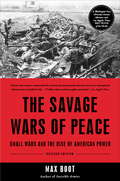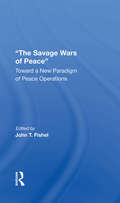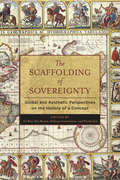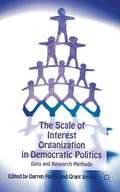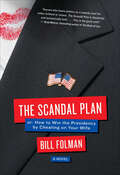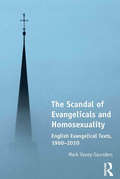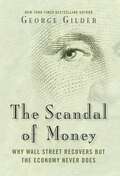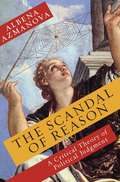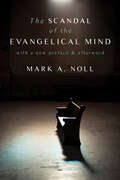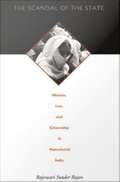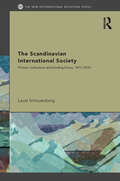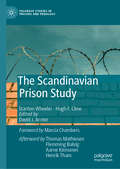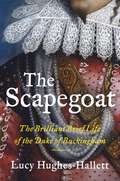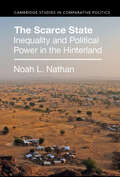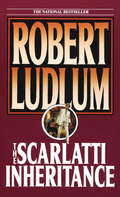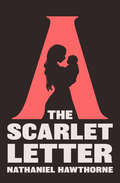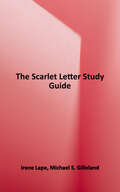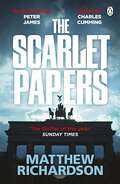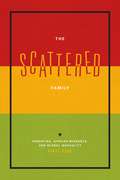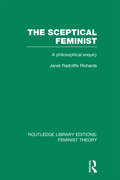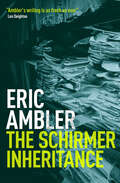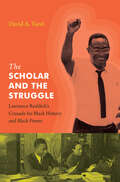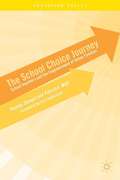- Table View
- List View
The Savage Wars Of Peace: Small Wars And The Rise Of American Power
by Max BootAmerica's "small wars," "imperial wars," or, as the Pentagon now terms them, "low-intensity conflicts," have played an essential but little-appreciated role in its growth as a world power. Beginning with Jefferson's expedition against the Barbary Pirates, Max Boot tells the exciting stories of our sometimes minor but often bloody landings in Samoa, the Philippines, China, Haiti, the Dominican Republic, Nicaragua, Mexico, Russia, and elsewhere. Along the way he sketches colorful portraits of little-known military heroes such as Stephen Decatur, "Fighting Fred" Funston, and Smedley Butler. From 1800 to the present day, such undeclared wars have made up the vast majority of our military engagements. Yet the military has often resisted preparing itself for small wars, preferring instead to train for big conflicts that seldom come. Boot re-examines the tragedy of Vietnam through a "small war" prism. He concludes with a devastating critique of the Powell Doctrine and a convincing argument that the armed forces must reorient themselves to better handle small-war missions, because such clashes are an inevitable result of America's far-flung imperial responsibilities.
The Savage Wars Of Peace: Toward A New Paradigm Of Peace Operations
by John FishelA historical overview of UN and non-UN peace operations, this book provides a theoretical framework for informing U.S. military doctrine as it relates to peacekeeping. The contributors, who are drawn from scholars, soldiers, diplomats, and security consultants, lay out the political and strategic context for peace operations and present case studies on traditional, aggravated, and enforcement operations, including UNPROFOR, UNOSOM II, UNFICYP-Cypress, ONUC-Congo. A historical overview of UN and non-UN peace operations, this book provides a theoretical framework for informing U.S. military doctrine as it relates to peacekeeping. The contributors, who are drawn from scholars, soldiers, diplomats, and security consultants, lay out the political and strategic context for peace operations and present case studies on traditional, aggravated, and enforcement operations, including UNPROFOR, UNOSOM II, UNFICYP-Cypress, ONUC-Congo.
The Savage Wars of Peace: Small Wars and the Rise of American Power
by Max BootThe smaller wars in which the United States has participated, and there are about one hundred eighty of them.
The Scaffolding of Sovereignty: Global and Aesthetic Perspectives on the History of a Concept (Columbia Studies in Political Thought / Political History)
by Stefanos Geroulanos Zvi Ben-Dor Benite Nicole JerrWhat is sovereignty? Often taken for granted or seen as the ideology of European states vying for supremacy and conquest, the concept of sovereignty remains underexamined both in the history of its practices and in its aesthetic and intellectual underpinnings. Using global intellectual history as a bridge between approaches, periods, and areas, The Scaffolding of Sovereignty deploys a comparative and theoretically rich conception of sovereignty to reconsider the different schemes on which it has been based or renewed, the public stages on which it is erected or destroyed, and the images and ideas on which it rests.The essays in The Scaffolding of Sovereignty reveal that sovereignty has always been supported, complemented, and enforced by a complex aesthetic and intellectual scaffolding. This collection takes a multidisciplinary approach to investigating the concept on a global scale, ranging from an account of a Manchu emperor building a mosque to a discussion of the continuing power of Lenin’s corpse, from an analysis of the death of kings in classical Greek tragedy to an exploration of the imagery of “the people” in the Age of Revolutions. Across seventeen chapters that closely study specific historical regimes and conflicts, the book’s contributors examine intersections of authority, power, theatricality, science and medicine, jurisdiction, rulership, human rights, scholarship, religious and popular ideas, and international legal thought that support or undermine different instances of sovereign power and its representations.
The Scale of Interest Organization in Democratic Politics
by Darren Halpin Grant JordanExplores the need for political science to pay more attention to complex interactions involving politically relevant groups. Distinguished contributors report on data from around the world and at different levels of political decision making - from 'below the radar' in local communities to global negations at the World Trade Organization.
The Scandal Plan: Or: How to Win the Presidency by Cheating on Your Wife
by Bill FolmanA presidential candidate behind in the polls concocts an outrageous scandal to improve his chances in this hilarious political satire in the spirit of Primary ColorsSenator Ben Phillips is the perfect man for the presidency. If only he weren't such a straight arrow. He's getting battered in the polls, and with only a few months until Election Day, his staff is growing desperate. Enter Thomas Campman, political guru. On a sudden inspiration, the eccentric Campman is convinced he can revitalize the candidate's image by creating a fake sex scandal for him. Nothing too over-the-top—just a little scandal to make Phillips seem more human. Maybe even cool.Though it takes some convincing, Phillips gives Campman the green light. The plan is set in motion, and, right on schedule, a phony former mistress steps forward to accuse the senator of infidelity. But scandals—even the premeditated kind—rarely go as planned. Before long, Campman's scheme snowballs into a three-ring circus complete with a linguistically challenged Mexican chauffeur who thinks he's James Bond, a highly sexed middle-aged woman who's convinced she'll never land one of the really good guys, and a political cub reporter for TeenVibe magazine who's sure he's on the trail of the biggest story since Watergate.For those too well acquainted with politics-as-usual, The Scandal Plan is the perfect antidote. It's a witty political farce in the tradition of Jon Stewart and Dave Barry that will have readers—and even candidates—laughing all the way to the polls.
The Scandal of Evangelicals and Homosexuality: English Evangelical Texts, 1960–2010
by Mark Vasey-SaundersEnglish evangelicals give the appearance of being a community at war, with each other and with the world around them. The issue of homosexuality is one of the key battlegrounds. How has this issue become so significant to evangelicals? Why is it provoking such violent responses? How is it changing evangelicals, and what might this mean for the future? This book examines the history of evangelical responses to the issue of homosexuality, setting them in a wider historical and cultural context and drawing on the work of Rene Girard to argue that the issue of homosexuality has come to symbolise deeply-held convictions within evangelicalism. The conflict over the issue that is now becoming apparent within evangelicalism reveals deep divisions within the evangelical community that will have great significance for the future. The Scandal of Evangelicals and Homosexuality offers an alternative perspective, seeking not to present an answer to the ethical question, but rather to examine the way the debate has become scandalised and consider the cost. It offers a window into contemporary English evangelicalism and provides an important contribution to international and ecumenical debate.
The Scandal of Money: Why Wall Street Recovers but the Economy Never Does
by George GilderWhy do conservatives have such a hard time winning the economic debate in the court of public opinion? Simple, George Gilder says: conservatives misunderstand economics almost as badly as liberals do. Republicans have been running on tax cut proposals since the era of Harding and Coolidge without seriously addressing the key problems of a global economy in decline. Enough is enough. Gilder, author of New York Times bestseller Wealth and Poverty, proposes a completely new framework for understanding economic growth that will replace failed 20th century conservative economics and turn the economic debate-and the country-around.
The Scandal of Reason: A Critical Theory of Political Judgment (New Directions in Critical Theory #47)
by Albena AzmanovaTheories of justice are haunted by a paradox: the more ambitious the theory of justice, the less applicable and useful the model is to political practice; yet the more politically realistic the theory, the weaker its moral ambition, rendering it unsound and equally useless. Brokering a resolution to this "judgment paradox," Albena Azmanova advances a "critical consensus model" of judgment that serves the normative ideals of a just society without the help of ideal theory. Tracing the evolution of two major traditions in political philosophy—critical theory and philosophical liberalism—and the way they confront the judgment paradox, Azmanova critiques prevailing models of deliberative democracy and their preference for ideal theory over political applicability. Instead, she replaces the reliance on normative models of democracy with an account of the dynamics of reasoned judgment produced in democratic practices of open dialogues. Combining Hannah Arendt's study of judgment with Pierre Bourdieu's social critique of power relations, and incorporating elements of political epistemology from Kant, Wittgenstein, H. L. A. Hart, Max Weber, and American philosophical pragmatism, Azmanova centers her inquiry on the way participants in moral conflicts attribute meaning to their grievances of injustice. She then demonstrates the emancipatory potential of the model of critical deliberative judgment she forges and its capacity to guide policy making. This model's critical force yields from its capacity to disclose the common structural sources of injustice behind conflicting claims to justice. Moving beyond the conflict between universalist and pluralist positions, Azmanova grounds the question of "what is justice?" in the empirical reality of "who suffers?" in order to discern attainable possibilities for a less unjust world.
The Scandal of the Evangelical Mind
by Mark A. NollWinner of the Christianity Today Book of the Year Award &“The scandal of the evangelical mind is that there is not much of an evangelical mind.&” So begins this award-winning intellectual history and critique of the evangelical movement by one of evangelicalism&’s most respected historians. Unsparing in his indictment, Mark Noll asks why the largest single group of religious Americans—who enjoy increasing wealth, status, and political influence—have contributed so little to rigorous intellectual scholarship. While nourishing believers in the simple truths of the gospel, why have so many evangelicals failed to sustain a serious intellectual life and abandoned the universities, the arts, and other realms of &“high&” culture? Over twenty-five years since its original publication, The Scandal of the Evangelical Mind has turned out to be prescient and perennially relevant. In a new preface, Noll lays out his ongoing personal frustrations with this situation, and in a new afterword he assesses the state of the scandal—showing how white evangelicals&’ embrace of Trumpism, their deepening distrust of science, and their frequent forays into conspiratorial thinking have coexisted with surprisingly robust scholarship from many with strong evangelical connections.
The Scandal of the State: Women, Law, and Citizenship in Postcolonial India
by Rajeswari Sunder RajanThe Scandal of the State is a revealing study of the relationship between the postcolonial, democratic Indian nation-state and Indian women's actual needs and lives. Well-known for her work combining feminist theory and postcolonial studies, Rajeswari Sunder Rajan shows how the state is central to understanding women's identities and how, reciprocally, women and "women's issues" affect the state's role and function. She argues that in India law and citizenship define for women not only the scope of political rights but also cultural identity and everyday life. Sunder Rajan delineates the postcolonial state in implicit contrast with the "enlightened," postfeminist neoliberal state in the West. Her analysis wrestles with complex social realities, taking into account the influence of age, ethnicity, religion, and class on individual and group identities as well as the shifting, heterogeneous nature of the state itself. The Scandal of the State develops through a series of compelling case studies, each of which centers around an incident exposing the contradictory position of the Indian state vis--vis its female citizens and, ultimately, the inadequacy of its commitment to women's rights. Sunder Rajan focuses on the custody battle over a Muslim child bride, the compulsory sterilization of mentally retarded women in state institutional care, female infanticide in Tamilnadu, prostitution as labor rather than crime, and the surrender of the female outlaw Phoolan Devi. She also looks at the ways the Uniform Civil Code presented many women with a stark choice between allegiance to their religion and community or the secular assertion of individual rights. Rich with theoretical acumen and activist passion, The Scandal of the State is a powerful critique of the mutual dependence of women and the state on one another in the specific context of a postcolonial modernity.
The Scandinavian International Society: Primary Institutions and Binding Forces, 1815-2010 (New International Relations)
by Laust SchouenborgThis book provides a comprehensive analysis of Scandinavia as a regional international society, including the Nordic Peace and the rise of the Scandinavian welfare state. Schouenborg aims to take the next big step in the theoretical development of the English School of International Relations - particularly the structural version introduced by Barry Buzan. He analyses the formation of a Scandinavian regional international society over a 200-year period and develops the concepts of ‘primary institutions’ and ‘binding forces’ as an analytical framework. In doing so, he not only offers one of the first systematic applications of English School structural theory, but also sheds a new comparative light on the distinctiveness of Scandinavian international relations, and provides a novel intervention in the debates about the emergence of the so-called Nordic Peace. In the first part of the book Schouenborg explains the core concepts and discusses how one may distinguish a regional international society from the broader global international society in which it is embedded. In the second part he provides an in-depth study of the Scandinavian case, focussing on the periods 1815 to 1919; 1919 to 1989; and 1989 to 2010. The Scandinavian International Society will be of interest to students and scholars of international relations theory, Scandinavian international relations and history, and researchers engaged in comparative welfare state studies.
The Scandinavian Prison Study (Palgrave Studies in Prisons and Penology)
by Stanton Wheeler Hugh F. ClineThis book presents the formerly-unpublished manuscript by Wheeler and Cline detailing the landmark, comparative prisons study they conducted in the 1960s which examined fifteen Scandinavian prisons and nearly 2000 inmates across four Nordic countries. At the time, it was the largest comparative study of prisons and inmate behavior ever undertaken and despite 15 years of analysis and write-up it was never published but it influenced many other important prison studies that followed. This book engages with the functionalist perspectives that were widespread in the 1960s, and tries to answer some of the classical questions of prison sociology such as how prisoners adapt to imprisonment and the degree to which prisoner adaptations can be attributed to characteristics of prisoners and prisons. It examines the nature and structure of prisons, the effect of that structure on individual prisoners and the other factors that may influence the way that they respond to confinement. It also includes discussion about the prisoners’ considerations of justice and fairness and a explanation of the study design and data which was highly unique at the time. The Scandinavian Prison Study brings Wheeler and Cline's pioneering work into the present context with a preface and an introduction which discuss the questions and claims raised in the book still relevant to this day.
The Scapegoat: The Brilliant Brief Life of the Duke of Buckingham
by Lucy Hughes-HallettShortlisted for the Pol Roger Duff Cooper PrizeFrom the winner of the Baillie Gifford Prize, an extraordinary history of the meteoric rise and fall of George Villiers, the first Duke of Buckingham.As King James I’s favorite, Buckingham was also his confidant, gatekeeper, advisor and lover. When Charles I succeeded his father, he was similarly enthralled and made Buckingham his best friend and mentor. A dazzling figure on horseback and a skillful player of the political game, Buckingham rapidly transformed the influence his beauty gave him into immense wealth and power. He became one of the most flamboyant and enigmatic Englishmen at the heart of seventeenth-century royal and political life.With a novelist’s touch, Lucy Hughes-Hallett transports us into a courtly world of masques and dancing, exquisite clothes, the art of Rubens and Van Dyck, gender-fluidity, same-sex desire, and appallingly rudimentary medicine. Witch hunts coexisted with Descartian rationality and public opinion was becoming a political force. Falling from grace spectacularly, Buckingham came to represent everything that was wrong with the country.From kidnappings and murder plots to men weeping in Parliament over civil liberties, The Scapegoat navigates love, war-fever and pacifism in a society on the brink of cataclysmic change. In this immersive and authoritative account, Hughes-Hallett summons an era that still resonates today.
The Scarce State: Inequality and Political Power in the Hinterland (Cambridge Studies in Comparative Politics)
by Noah L. NathanStates are often minimally present in the rural periphery. Yet a limited presence does not mean a limited impact. Isolated state actions in regions where the state is otherwise scarce can have outsize, long-lasting effects on society. The Scarce State reframes our understanding of the political economy of hinterlands through a multi-method study of Northern Ghana alongside shadow cases from other world regions. Drawing on a historical natural experiment, the book shows how the contemporary economic and political elite emerged in Ghana's hinterland, linking interventions by an ostensibly weak state to new socio-economic inequality and grassroots efforts to reimagine traditional institutions. The book demonstrates how these state-generated societal changes reshaped access to political power, producing dynastic politics, clientelism, and violence. The Scarce State challenges common claims about state-building and state weakness, provides new evidence on the historical origins of inequality, and reconsiders the mechanisms linking historical institutions to contemporary politics.
The Scarlatti Inheritance: A Novel (Mini-hardbacks Ser.)
by Robert LudlumHer weapons: Money and Power. Her target: The most dangerous man in the world--her son. Elizabeht Wyckman Scarlatti has a plan--a desperate, last-minute gamble--designed to save the world from her own son, Ulster, an incalculably dangerous man who is working under the name of Heinrich Kroeger: Unless she can stop him, he is about to give Hitler's Third Reich the most powerful triumph on earth. BONUS: This edition includes an excerpt from Robert Ludlum's The Bourne Identity.
The Scarlet Letter
by Nathaniel HawthorneNathaniel Hawthorne’s masterpiece: A searing portrait of sin and redemption in Puritan New England When Hester Prynne, a young Puritan woman in seventeenth-century Boston, becomes pregnant out of wedlock, the unforgiving society in which she lives judges her harshly. Sentenced to wear a scarlet A emblazoned on her dress, Hester raises her daughter, Pearl, on the outskirts of town—an exile meant to cause her shame for the remainder of her life. In refusing to name Pearl’s father, Hester seeks to protect the minister Arthur Dimmesdale from sharing her fate. As the years pass, Dimmesdale grows weaker, eroded by his guilt, while Hester finds renewal in a defiant reclamation of her strength and identity. Their diverging paths lead to a searing final scene that stands among the most powerful in American literature. This ebook has been professionally proofread to ensure accuracy and readability on all devices.
The Scarlet Letter Study Guide
by Irene Lape Michael S. GillelandThrough Nathaniel Hawthorne's timeless tale of sin, guilt, vengeance, and redemption, students will learn: Background Information: Do some research to learn more about the early history of the Massachusetts Bay Colony, Romanticism, and Transcendentalism. Author Biography Vocabulary words used throughout the novel, utilizing a variety of activities to stimulate retention and growth. Literary Techniques: Grammar and parts of speech, root words, foreshadowing, imagery, synonym, personification, compare & contrast, in context. Moral Lessons and Character Values: Keeping secrets, lying, shame, penance, and martyrdom, judging others, correction and pride, vengeance, confession, subjective morality, reconciliation with God. Activities and Writing Assignments: Pre-reading analysis papers on civil government, biblical view of sin, and biblical response to people. Brook Farm research. Point-of-view summary essay. Puritanism research paper. Analyze patterns in the novel. Suggestions for Further Reading: We include an in-depth reading list of more books by the same author(s) and other books that tie in with, or are similar to, The Scarlet Letter. All of the unit lessons are written from a Christian worldview! - Large 8.5x11 printed workbook format is convenient to read and easy on the eyes - Every question has plenty of whitespace for student's answers - Encourages neat and clean handwriting practice - Easily transports without the need for a laptop or other expensive equipment - Provides a permanent record of the student's work - Convenient, removable answer key included for the teacher! - Study guides do not contain the text of the story, play, poems, or book.- Recommended for grades 9-12. - Setting: Massachusetts 1640s - Genre: American literature, Historical literature
The Scarlet Papers: The Times Thriller of the Year 2023
by Matthew RichardsonTHE BOOK THOSE IN THE KNOW ARE CALLING THE BEST SPY NOVEL OF THE YEAR*** One of the 50 BEST BOOKS OF THE YEAR 2023 in the Daily Telegraph ****** A SUNDAY TIMES BOOK OF THE YEAR 2023 ****** A GUARDIAN BOOK OF THE YEAR 2023 ***‘Superbly constructed in an elaborate twisty spy yarn. It's highly unlikely that there will be a better espionage novel this year’ THE SUNDAY TIMES'A breathtaking thriller. A classic in the making' PETER JAMES'Hugely impressive and compelling' WILLIAM BOYD‘A natural-born storyteller’ JEFFERY DEAVER___________London, present dayHistorian Max Archer is invited to a clandestine meeting with legendary Cold War spymaster, Scarlet King.Her offer to share the explosive secrets born of over half a century at the heart of global espionage would be life-changing. But Max has little reason to trust a woman whose name is a byword for deceit and ruthlessness.Soon he is on the wrong side of the law and on the run. As the net closes tighter around him he must somehow discover the truth. Because it’s not just his life on the line – but also the fate of the Western world . . .___________‘Intricate and fast moving, it weaves a thrilling spell’ DAILY MAIL'Smart, slick and totally gripping . . . The Scarlet Papers is always credible, always startling and almost painfully human. A total triumph' TONY PARSONS'A masterpiece' TIM GLISTER*** DISCOVER MY NAME IS NOBODY AND THE INSIDER, FURTHER SPY NOVELS BY MATTHEW RICHARDSON ***
The Scattered Family: Parenting, African Migrants, and Global Inequality
by Cati CoeToday’s unprecedented migration of people around the globe in search of work has had a widespread and troubling result: the separation of families. In The Scattered Family, Cati Coe offers a sophisticated examination of this phenomenon among Ghanaians living in Ghana and abroad. Challenging oversimplified concepts of globalization as a wholly unchecked force, she details the diverse and creative ways Ghanaian families have adapted long-standing familial practices to a contemporary, global setting. Drawing on ethnographic and archival research, Coe uncovers a rich and dynamic set of familial concepts, habits, relationships, and expectations—what she calls repertoires—that have developed over time, through previous encounters with global capitalism. Separated immigrant families, she demonstrates, use these repertoires to help themselves navigate immigration law, the lack of child care, and a host of other problems, as well as to help raise children and maintain relationships the best way they know how. Examining this complex interplay between the local and global, Coe ultimately argues for a rethinking of what family itself means.
The Sceptical Feminist: A Philosophical Enquiry (Routledge Library Editions: Feminist Theory)
by Janet Radcliffe RichardsA systematic and original study of feminist issues, The Sceptical Feminist fights a battle on two fronts: against the view that little or nothing is wrong with women’s position, and at the same time against much current feminist dogma. It is written by a philosopher who, in the tradition of John Stuart Mill’s classic The Subjection of Women, avoids the psychological and sociological speculation characteristic of much recent feminism and concentrates on the analysis of arguments. By these means she constructs a powerful and often unexpected case for radical change in the position of women, as well as for a change of attitude among many feminists. From her analysis, Janet Radcliffe Richards argues that positive discrimination in favour of women is essential for justice, that traditional sexual roles never had anything to do with beliefs about each sex’s capabilities, that current abortion practice reflects a disguised wish to punish women’s sexual activity, that ‘women’s work’ is rightly little valued, and that traditional ideals of femininity are inherently pernicious. But she also argues that a movement for sexual justice cannot ‘take the woman’s side in everything’, that feminism should not be thought of as the primary struggle, that dismissing ‘male’ logic and science will undermine feminists’ own intentions, that the state should not subsidise motherhood, that ever available crèches would be disastrous for women, that there is no inherent degradation in prostitution, and that contempt for beauty and adornment has nothing to do with feminism. This is a book for feminists, for their critics, and for students of moral, political and social philosophy.
The Schematic State
by Debra ThompsonBy examining the political development of racial classifications on the national censuses of the United States, Canada, and Great Britain, The Schematic State maps the changing nature of the census from an instrument historically used to manage and control racial populations to its contemporary purpose as an important source of statistical information, employed to monitor and rectify racial discrimination. Through a careful comparative analysis of nearly two hundred years of census-taking, it demonstrates that changes in racial schemas are driven by the interactions among shifting transnational ideas about race, the ways they are tempered and translated by nationally distinct racial projects, and the configuration of political institutions involved in the design and execution of census policy. This book argues that states seek to make their populations racially legible, turning the fluid and politically contested substance of race into stable, identifiable categories to be used as the basis of law and policy.
The Schirmer Inheritance
by Eric AmblerA lawyer unearths deadly secrets reaching back to the Napoleonic era in this “masterful contribution to the literature of international dirty work” (The New Yorker).Former WWII bomber pilot George Cary has a promising postwar career ahead of him as a newly minted lawyer, though his first assignment at his prestigious Philadelphia law firm isn’t exactly glamorous. He’s been tasked with going through the copious, dusty files on the Schneider Johnson case, in which the search for an heir to a family fortune yielded no results.When Cary discovers something despite the dead ends and false claims, it leads him to Europe where he begins to unravel a twisting, secret history. Soon, Cary is drawing connections between a deserter from Napoleon’s defeated army to a guerrilla fighter in post-war Greece. Determined to pursue the whole truth, Cary finds himself in a dangerous situation where survival depends more on his military experience than anything he learned in law school.
The Scholar and the Struggle: Lawrence Reddick's Crusade for Black History and Black Power
by David A. VarelLawrence Reddick (1910–1995) was among the most notable African American intellectuals of his generation. The second curator of the Schomburg Library and a University of Chicago PhD, Reddick helped spearhead Carter Woodson's black history movement in the 1930s, guide the Double Victory campaign during World War II, lead the Southern Christian Leadership Conference during the Cold War, mentor Martin Luther King Jr. throughout his entire public life, direct the Opportunities Industrialization Center Institute during the 1960s, and forcefully confront institutional racism within academia during the Black Power era. A lifelong Pan-Africanist, Reddick also fought for decolonization and black self-determination alongside Kwame Nkrumah, Nnamdi Azikiwe, Leopold Senghor, and W. E. B. Du Bois. Beyond participating in such struggles, Reddick documented and interpreted them for black and white publics alike.In The Scholar and the Struggle, David A. Varel tells Reddick's compelling story. His biography reveals the many essential but underappreciated roles played by intellectuals in the black freedom struggle and connects the past to the present in powerful, unforgettable ways.
The School Choice Journey
by Thomas Stewart Patrick J. WolfThis in-depth chronicle of 110 families in Washington, DC's Opportunity Scholarship Program provides a realistic look at how urban families experience the process of using school choice vouchers and transform from government clients to consumers of education and active citizens.
